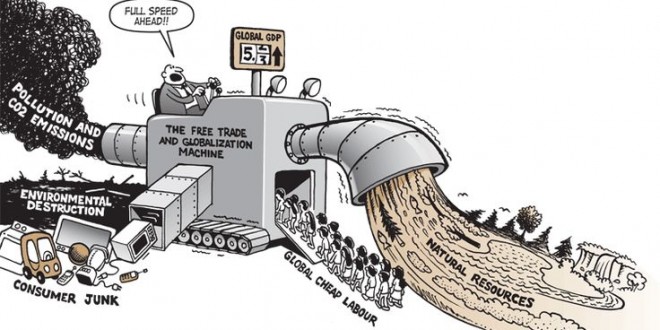TAKIS FOTOPOULOS
(01.05.2015)
Abstract: The article aims first to draw a clear distinction between neoliberal globalization (i.e. neoliberalism), as a structural or systemic change and neoliberal ideology. This distinction is necessary today, as many in the globalist Left confuse the two or simply consider neoliberalism as just an ideology, which can easily be abandoned. Then, it is shown that contrary to what Paul Krugman and many in the globalist “Left” assert, the cause of the present crisis is not the austerity policies adopted by some “baddies’” but neoliberal globalization itself. This implies that only a break with the NWO of neoliberal globalization can restore economic and national sovereignty, which is the necessary condition for a policy of self-reliance that is the only way out of the present catastrophe in countries like Greece.
Neoliberal globalization vs. neoliberal ideology
The post-war internationalisation of the market economy, which led to the present globalization, was actively encouraged by the advanced capitalist countries in view in particular of the expansion of “actually existing socialism” and of the national liberation movements in the Third World. However, as I showed elsewhere,[1] the internationalisation was basically the outcome of “objective” factors related to the dynamics of the market economy and, in particular, to the expansion of transnational corporations’ (TNCs) activity and the parallel growth of the Euro-dollar market. The Euro-dollar market provided a regulation-free environment where US dollars (and later other strong currencies like the yen, mark etc.) could be borrowed and lent free of any US regulatory and tax requirements. The growth of this new market, which simply reflected the growing needs of TNCs was instrumental in the later lifting of exchange and capital controls. This is because the exchange controls of nation-states, particularly those in Britain where the Euro-dollar market originated,[2] were put under severe strain, throughout the 1970s. This informal, at the beginning, opening and liberalization of markets to cover the needs of TNCs was then institutionalized, initially by conservative politicians (Thatcher and Reagan) to be followed later by governments of every persuasion: from Christian democrats and conservatives to social democrats, liberals and any combination between them.
In fact, the vast expansion of TNCs, a new phenomenon in the history of the capitalist market economy ―which characterizes (together with the collapse of the Soviet bloc) the New World Order, would have been impossible without open and liberalized markets for commodities and capital. However, this was not the result of some conspiracy by “bad” economists and politicians exploiting some kind of crisis, as some best-seller conspiracy theorists of the globalist “Left” suggest. Instead, this was just the inevitable effect that followed the collapse of the social-democratic model, which was based on national markets and, as such, was not compatible anymore with the growing internationalization of the market economy. In other words, governments in the new framework had to follow neoliberal policies to make their economies competitive and capable of continued growth involving further expansion of the consumer society.
At the same time, liberal economists (as opposed to “statist” Keynesian ones, who were dominant in the immediate post war period, during the statist phase I mentioned above) revived a mix of neoclassical economics with monetarism and supply-side economics into what has been called neoliberal economics, which involved policies aiming at the abolition of any effective social control of the economy: from the shrinking of the public sector (through mass privatizations and the effective dismantlement of the welfare state as well as a drastic reduction of government spending) to deregulation of the markets for commodities, labor and capital, in order to enhance the role of the private sector (i.e. of the transnational corporations which control it). The new neoliberal ideology was of course also adopted by the mass media controlled by the TNCs and other press magnates that promoted it as the dominant social paradigm of the new era ―i.e. as the system of beliefs, ideas and the corresponding values which are dominant in a particular society at a particular moment of its history.[3]
Therefore, one has to draw a clear distinction between the ideology of neoliberalism and neoliberalism itself. The ideology of neoliberalism was created in order to justify (“objectively”, as every systemic ideology is supposed to do), the need for the systemic change, i.e. for the opening and liberalization of markets, on which neoliberal globalization was founded. In other words it was the structural change that the emergence and massive expansion of Transnational Corporations signaled ―as a result of the grow-or-die dynamic of the system of the capitalist market economy― which led initially to an informal opening of markets that later on was institutionalized. Clearly, the ideology of neoliberalism, as any kind of systemic ideology, followed the structural change (as liberal ideology followed the emergence of the system of the capitalist market economy) and not vice versa.
Yet, the globalist “Left”, (including many in the antisystemic Left, even Marxists) do not draw this crucial distinction and usually confuse ―sometimes deliberately― the systemic phenomenon (neoliberal globalization), which belongs to the economic base, with the ideology of globalization which belongs ―in Marxist terms― to the superstructure. In this way, they derive an a-historical “theory” about “bad” capitalists/politicians conspiring to impose “neoliberalism”, as a means of expanding profits, capital accumulation etc. at the expense of workers. No wonder that even Eric Hobsbawm, the doyen of Marxist historians, was perceptively(!) predicting the imminent end of neoliberalism at the very beginning of the new millennium,[4] while modern Marxists (more modestly!), presently declare that although neoliberalism is not dead yet, it is certainly “dying”. All we have to do is to replace the neoliberal institutions as follows:
The time has therefore come to turn the page and to reorient development strategies toward production, toward more educated, better-paid labour, toward reindustrialisation, and toward social programs and a new welfare state. But to do this we have to tear down the economic and political institutions of neoliberalism, just as neoliberalism earlier destroyed the social-democratic and communist institutions of the one-time Sozialstaat (social state). Can this be achieved without revolutions? Perhaps in some cases, but only in the context of revolutions elsewhere, in something like the way that Scandinavian social democracy benefited from the Russian Revolution of 1917.[5]
Others talk about the “bad” capitalism of today compared to the “good” old capitalism, arguing that the problem is the corporatization of the market economy, which, supposedly, represents “an attack on markets and democracy”.[6] However, as I showed elsewhere,[7] the problem is not the corporatization of the market economy, as this development was unavoidable anyway within the grow-or-die dynamic that characterizes the system of the market economy. Therefore, as this dynamic was not reversed by the social struggle, it was bound to lead to the corporatization of the market economy. In other words, the problem is not the corporatization of the capitalist market economy, as if some other kind of capitalist market economy was feasible or desirable, but the capitalist market economy itself. Otherwise, one may easily end up blaming the elites for violating the rules of the game, rather than blaming the rotten game itself.
In a nutshell, neoliberalism was not just an invention by some bad economists and politicians, whose advice was adopted by greedy capitalists, as an intellectually bankrupt globalist “Left” suggests. It was, instead, the inevitable outcome of a capitalist globalization based on TNCs, which could only be neoliberal. This is because the opening and liberalization of markets ―a pre-requisite for the efficient functioning of TNCs― is aimed to create a level playing field to TNCs not only with respect to the economic framework within which they had to operate but also with respect to the social framework. For instance, capitalist globalization implies not only the homogenization of legislation as regards hiring and firing workers (“flexible” labor relations) but also the homogenization of social services to the least common denominator, i.e. to the least expensive “welfare system”, so that TNCs could get the best possible conditions for profit maximization (in terms of very low taxation etc.), in any country fully integrated into the NWO.
Austerity policies or neoliberal globalization the real enemy?
However, in the 1990s and 2000s the globalist “Left” included, at least, in their vocabulary the word “neoliberal” ―deliberately confusing of course the systemic phenomenon (neoliberal globalization) with the ideology of it. On the other hand, the globalist “Left” in this decade ceased even to use the word “neoliberal” itself, in a clear attempt to turn people’s minds away from anything to do with their real enemy. That is, the systemic phenomenon of neoliberal globalization and the implied opening and liberalization of markets, which is the ultimate cause of the dismantling of the welfare state and of Keynesian economics itself.
In other words, it is the opening and liberalization of markets which tends to universalize the rudimentary “welfare services” system of the USA and the associated low corporate taxation and shrinking of state spending, as the lowest common denominator to which any country wishing to have growth and employment has to conform. Why? Because growth and employment in an economy integrated into the NWO of neoliberal globalization, which is characterized by open and liberalized markets for capital, labor and commodities, crucially depends on competitiveness. It is relatively high competitiveness, which will attract more Transnational Corporations and therefore more investment that, in turn, will lead to more growth and employment. This, is in contrast to the era of nation-states when growth and employment crucially depended on the national market (as markets were not open at the time), in which case, of course, it mattered a lot whether governments were pursuing policies of balanced budgets (what we may call today “austerity policies”) or instead expansionary policies to boost aggregate (domestic) demand, even if this implied deficit budgets, particularly in periods of recession ―as Keynesian economics, which was dominant at the time, prescribed.
Yet, today not only naïve economists belonging to the globalist “Left” support Keynesian policies, presumably still living in a nation-state time capsule with its Keynesian policies and all its ideological paraphernalia, but even Nobel laureates in economics. Of course in the latter case one does not talk anymore about naivety but instead, about deliberate disorientation. This is the case of Paul Krugman, who, in a just published article in the Guardian,[8] the flagship of the globalist “Left”, systematically attempts to bypass the crucial issues of our era and particularly globalization and its neoliberal ideology and concentrates, instead, on the austerity “delusion” or “obsession” of policy makers, particularly in UK ―conveniently “forgetting” that these are also the EU policies, as well as the US policies since Reagan. In other words, these are the policies of the Transnational Elite imposed, one way or another, on every country integrated into the NWO.
Thus, in a long article of almost 6,000 words the words “neoliberal” and globalization, let alone “competitiveness”, are not mentioned even once. So, Krugman “forgetting” that we live in a globalized world in which competitiveness is crucial even for growth and employment, he talks about why Keynesian policies are best for each nation-state! At least, however, this apologist for globalization (who justifiably was awarded by the Transnational Elite ―through the Nobel prize committee which does a very good job in promoting, directly or indirectly globalization― the highest accolade for any systemic economist) had the frankness to admit that big business, unlike economists like himself and politicians, love austerity policies but then he goes on to disorient, yet again, about their reasons for doing so:
I’ve already suggested one answer: scare talk about debt and deficits is often used as a cover for a very different agenda, namely an attempt to reduce the overall size of government and especially spending on social insurance. This has been transparently obvious in the United States, where many supposed deficit-reduction plans just happen to include sharp cuts in tax rates on corporations and the wealthy even as they take away healthcare and nutritional aid for the poor.[9]
However, the cuts in public spending and the general shrinking of the public sector through privatizations etc. as well as of the welfare state are directly linked with the cuts in corporate taxes and taxes in general and the corresponding policies to eliminate budget deficits. In fact, all of them together constitute the core of neoliberal globalization. But Krugman does not want to talk about globalization and competitiveness ―these are the “dirty” words businessmen and politicians have to say whereas Krugman’s mandate, as a Nobel laureate in economics, is to disorient people from their real enemy, the NWO of neoliberal globalization, and turn them instead against non-systemic factors, which do not challenge the system itself but just the “baddies” in the political elites who implement the austerity policies! The political consequence of such disorienting views is that when the globalist Left adopting such misleading ideas comes to power it turns against the austerity policies implemented by the political personnel running the NWO, instead of attempting to break with the NWO itself. This is the case for instance of Greece, where the victory of the globalist Left (SYRIZA) instead of leading to an exit from the EU and the implementation of self-reliance policies, led to the present fiasco where the “Left” government begs the Euro-elites for more liquidity (as the country does not control anymore even its own currency), which of course is not forthcoming unless it fully submits to the conditions they impose for further integration of the country into the NWO!
* This article is an extract from the book THE NEW WORLD ORDER IN ACTION: War and economic violence, from the Middle East through Greece to Ukraine (to be published shortly by Progressive Press).
[1] Takis Fotopoulos, Takis Fotopoulos, Towards an Inclusive Democracy, (London/NY: Cassell/ Continuum, 1997/1998)) Ch. 1.
[2] For an excellent description of the gradual lifting of capital controls in Britain under market pressure, see Will Hutton, The State We’re In (1995), Ch. 3.
[3] see Takis Fotopoulos, “Mass media, culture and democracy”, Democracy & Nature, vol.5, no.1 (March 1999), pp. 33-64
[4] Perry Anderson, New Left Review, No. 1 (new period) (Jan/Feb 2000), p. 10.
[5] Boris Kagarlitsky, “Economic policies after the death of neoliberalism,” (Russian) Institute for Global Research (8/4/2015).
[6] Noam Chomsky, “Domestic Constituencies,” Z Magazine (May 1998).
[7] Takis Fotopoulos, “Mass media, culture and democracy”.
[8] Paul Krugman, “The austerity delusion,” Guardian (29/4/2015).
[9] Ibid.
The International Journal of Inclusive Democracy : http://www.inclusivedemocracy.org/journal/
 ANTIGLOBALIZATION – SELF-RELIANCE – INCLUSIVE DEMOCRACY Building Popular Fronts for National and Social Liberation (FNSL): for a Democratic Community of Sovereign Nations towards an Inclusive Democracy
ANTIGLOBALIZATION – SELF-RELIANCE – INCLUSIVE DEMOCRACY Building Popular Fronts for National and Social Liberation (FNSL): for a Democratic Community of Sovereign Nations towards an Inclusive Democracy







